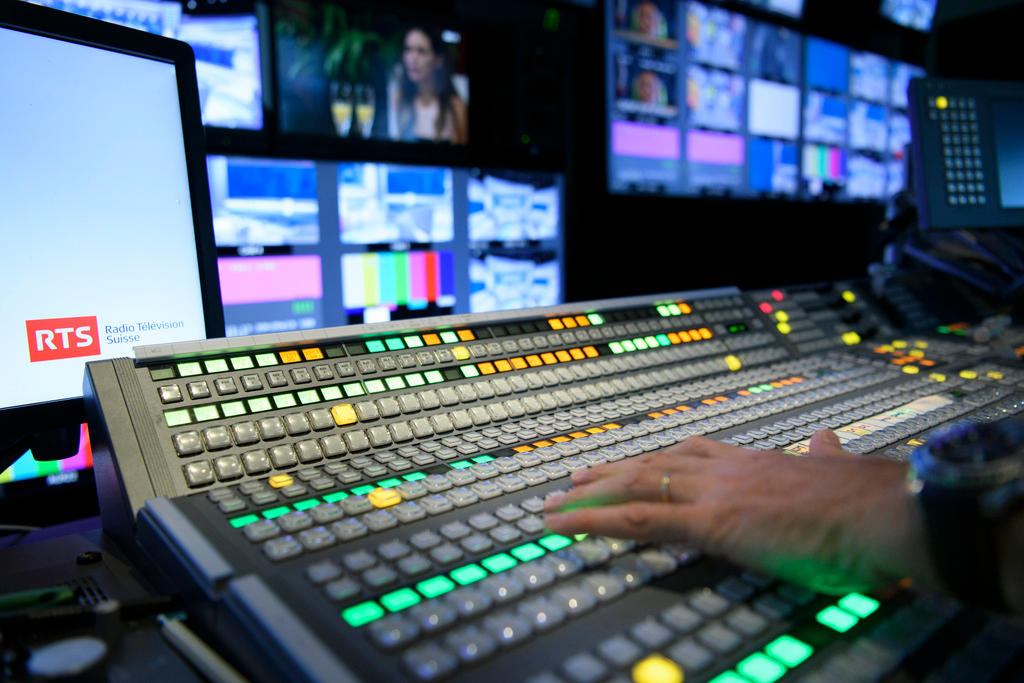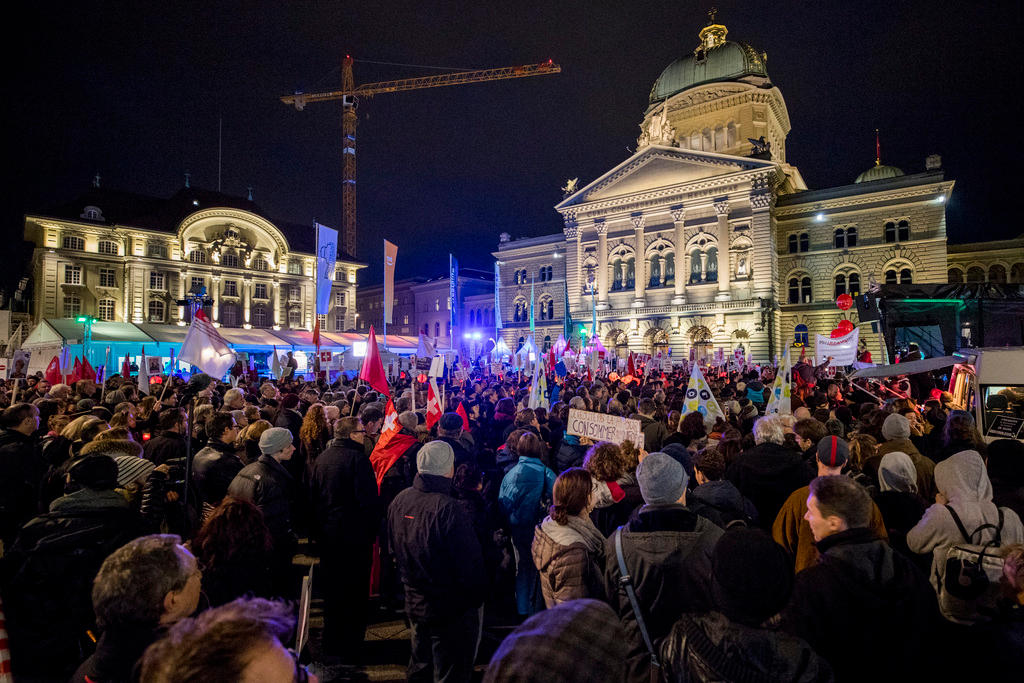Support wanes for abolition of public broadcast fee

A proposal to scrap the mandatory licence fee for services of the Swiss Broadcasting Corporation (SBC) has lost more ground, according to a major opinion poll.
The survey, published on Wednesday ahead of a nationwide vote on March 4, found that nearly two out of three people will reject the initiative. The initiative was launched by the youth chapters of the two major parties on the right of the political spectrum.
Support for the initiative dropped 5% compared with a previous poll carried out by the leading GfS Bern research institute on behalf of the SBC in January.
“The long-running debate has been losing steam and chances of the initiative gaining the upper hand are waning,” says GfS political scientist Martina Mousson.
Discussions about the initiative began last October, triggering emotional campaigns and broad coverage in the following month both by traditional and social media.
“The involvement of civil society against the initiative led to heated debates, pushing supporters of the initiative into a corner,” says Lukas Golder, co-director of the GfS Bern institute.
“It seems that pledges by the SBC top management to reform the public broadcaster were thought credible notably among people in the main German-speaking part of the country.”
The researchers say they found no signs of a protest vote or a last-minute mass mobilisation of voters. They expect an average turnout of between 45% and 50% on March 4.
“The situation at the moment appears to be clear, and there is every indication that the initiative will be thrown out by voters in ten days,” Mousson added.
National cohesion and media quality
The reasons for or against the initiative have largely remained the same, according to the pollsters.
Initiative supporters argue the SBC, which also includes swissinfo.ch, is too dominant and should be forced to downsize. They also say it is unfair to impose the licence fee on private households and companies alike.
However, opponents say scrapping the licence fee system would be the end of the SBC, which provides services in German, French, Italian and Romansh on its domestic channels, and would undermine the cohesion of multilingual Switzerland.
Others fear that the overall quality of the media would suffer and powerful private publishers would try to extend their influence on politics.
+ Here’s a fact check of the arguments in parliament for and against the licence fee
No major age gap
The researchers identified some support for the initiative among the grassroots of the Swiss People’s Party and other rightwing groups, notably in the Italian-speaking part of the country.
However, most respondents from urban as well as rural regions came out against the initiative.
“A clear majority apparently wants public service media,” says Golder. He adds that only a minority, notably supporters of a libertarian policy hoping to limit the role of the state, have a fundamental problem with the public licence fee.
Pollsters interviewed 1,400 Swiss citizens from all language regions across the country for the second of two nationwide surveys.
Swiss expatriates are not included in the poll for data protection reasons.
The telephone interviews, both with fixed line and mobile phone users, took place from February 7-14.
The margin of error is 2.7%.
The survey was commissioned by the Swiss Broadcasting Corporation (SBC), swissinfo’s parent company, and carried out by the leading GfS Bern research and polling institute.
Compared with the first SBC-commissioned poll, the age gap between the older and younger generations is less pronounced.
“There is a higher tendency among younger citizens to approve the initiative, but the poll found no majority in this age group.”
The proposal to do away with the licence fee has the official support of the Swiss People’s Party and the Federation of Small- and Medium-sized Enterprises. However, the government, a majority in parliament, most of the political parties as well as organisations from civil society have recommended rejection.
Federal taxes
A second issue that will come to a nationwide vote on March 4 is a 15-year extension of the national government’s right to raise taxes. This is widely expected to pass easily.
Pollsters found three out of four respondents saying they will approve this. The issue at stake has been largely sidelined by the initiative on the public broadcasting licence fee, experts say.
Parliament overwhelmingly came out in favour of the extension, and there has been almost no organised opposition.
Under the three-tier Swiss systemExternal link, taxpayers pay most of their dues to the cantonal and local authorities.
The federal taxes, including value added tax, currently make up two thirds of the annual national revenue – around CHF44 billion ($47 billion) in 2016.
The finance ministry warned rejection of the extension would be an absolute disaster for the state.

In compliance with the JTI standards
More: SWI swissinfo.ch certified by the Journalism Trust Initiative




You can find an overview of ongoing debates with our journalists here. Please join us!
If you want to start a conversation about a topic raised in this article or want to report factual errors, email us at english@swissinfo.ch.